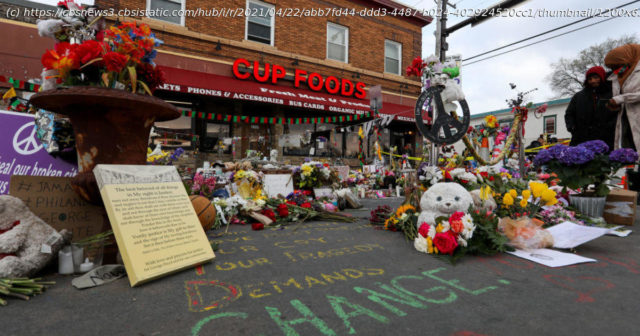Nine activists and legal experts tell CBS News how Chauvin’s verdict could or could not impact America’s police reform.
When Derek Chauvin was found guilty on all three counts in George Floyd’s death, Floyd’s family in Houston sobbed and embraced each other with tight hugs. The family’s attorney called the case a « turning point » for police accountability and Floyd’s brother, Terrence, said, « It’s a great day to be a Floyd. » Criminal justice advocates have used Floyd’s case — and the countless others killed by police — as proof that cases of excessive force will continue to happen without direct and explicit reform. While some saw Chauvin’s guilty verdict — a rare murder conviction for a police officer in an on-duty incident — as a victory, others said his conviction did not represent justice. CBS News spoke with nine activists and legal experts on the impact of Chauvin’s conviction and how his guilty verdict will — and won’t — change policing in America. Floyd’s death and the subsequent handling of other high-profile cases of fatal police shootings have skyrocketed the topic of reform to an issue of national importance, said Dr. Amara Enyia, policy and research coordinator for the Movement for Black Lives. With Chauvin’s verdict, she believes this moment of « relief » and « sadness » will act as a flashpoint for protestors and advocates to push for the most « radical » versions of police reform: defunding. « (Activists) do not want the usual rhetoric that comes around in these sorts of incidents for police training or additional investments of police. That’s simply not satisfactory, » said Enyia. « Quite frankly, it’s not what this particular moment demands. There’s an opportunity to finally push beyond the sort of conversations that we’ve always had to start actively engaging in the process of what it looks like to build systems that actually have the values and the self-determination that Black people and other people who have been abused and killed by this system deserve. » The George Floyd Justice in Policing Act, which in the House last month, uses Floyd’s legacy as a case to make specific changes to key police policies, including banning chokeholds and no-knock warrants, ending qualified immunity for officers, and making it easier for police to be held accountable for abuses. « The Senate will continue to work — that work as we strive that George Floyd’s tragic death will not be in vain, » Senate Majority leader Chuck Schumer said Wednesday. « We will not rest until the Senate passes strong legislation to end the systemic bias in law enforcement. » Robert Rooks, CEO of Reform Alliance, acknowledged the impact reform bills have had on the justice system but said the country needs to see a larger overhaul of the country’s parole and probation systems. « We have movement in the George Floyd Justice in Policing Act, and I call upon lawmakers to pass this legislation. As importantly, there is a national conversation about how we must have an ecosystem of reform to make lasting and sustainable change, » said Rooks. « There are 4.5 million people in the parole and probation system today and every four minutes one is returned to prison on a non-criminal technicality. Reform of probation and parole is a major part of the holistic approach to public safety, well-being and stability. » Laurie O. Robinson, a professor at George Mason University and former assistant attorney general for the Office of Justice in the U.S. Department of Justice, said that normally, prosecutors worry that cases against police officers are « very hard to win. » Robinson believes the verdict could give prosecutors more confidence during cases against police officers and would, « lessen the worry factor for prosecutors who’ll say, ‘If cases are presented well, you can convince juries to convict.' » Minnesota Attorney General Keith Ellison said he wasn’t sure the jury would find Chauvin guilty until the verdict was read. »I was never convinced we were going to win this case until we heard the verdict of guilty, » Ellison told « 60 Minutes.






